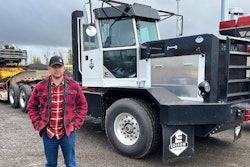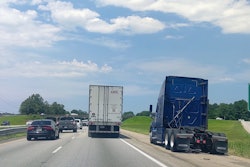If you took the advice in my last story and read your insurance policy or policies, I wouldn’t be surprised to learn that you discovered that something (a peril, cargo commodity, operation type or location, etc.) that you need coverage for is left out. It’s actually not that uncommon.
Thankfully, there’s almost always a solution, and frequently it is fairly simple to get the necessary coverage added to the existing policy.
Other times, however, because of the uniqueness of what coverage is missing, we may need to consider other insurance options that are available.
The (sometimes) easy updates: Adding trucks, drivers
The most common missing coverages are somewhat obvious. In fact, most all of us are familiar with them -- situations where you’ve bought/sold a truck or trailer, hired/fired a driver, or moved to a new address. Adding or removing equipment and adding or removing a driver is as simple as notifying your insurance agent. Most agencies, including mine, will require some type of documentation from the insured requesting the change. Typically, the only challenge here is when the insured wants to add more trucks or drivers than the insurance policy will allow for.
From time to time one of my new insureds, with less than one year in business, will buy a truck or two to grow their company. They will call me up and ask to add the new truck(s) to their existing policy, but in some cases they’ve forgotten that their policy does not allow them to exceed one truck within the first two years of business.

That leaves them with a difficult choice to make. I can either get them a policy from another insurance company, which will all but certainly have a much higher premium, or they need to sell the extra truck(s) so they are not in violation of failing to schedule all owned and/or operated commercial vehicles on their policy.
[Related: Why every truck owner should read their insurance policies]
More difficult changes: Address, commodities hauled
An address change isn’t always simple. If it’s only a mailing address change, or a business address change that is within the same state, it’s typically the same process as adding or removing equipment or drivers. But if it’s a new business address in a different state, it can become quite cumbersome and a bit complicated very quickly. Often, such a change can even necessitate a new insurance agent and/or a different insurance company handling the coverage.
Why? Because every insurance company has to be approved by each state’s Department of Insurance to provide insurance in that state. Many insurance companies that provide commercial auto coverage with filings (the BMC91 filing for the MCS90 endorsement required by the Federal Motor Carrier Safety Administration) are limited to a number of states. Only a few insurance companies offer commercial auto insurance nationwide. That’s likewise true for insurance agents. We are required to be appointed (licensed) in each state in which we have insureds we are a producer (agent) for.
Changing or updating commodities is where things can get dicey fast. As I explained in this story, answering the question of just why an insurance company might not be able to give you a quote for a policy, insurers only insure trucking companies that fit their specific appetite. All insurance companies I am aware of have commodities that fit their appetite and commodities that don’t. As such, an insurance company will not provide insurance to any trucking company that hauls those commodities that don’t fit their commodities appetite.
Among the most unappetizing commodities is hazmat freight that requires placards. A limited number of insurance companies will provide insurance to any trucking company hauling hazmat. Additionally, the ones I am aware of all require that a trucking company have many consecutive years of safe operations before they will even consider offering a quote.
Sometimes, insurers’ commodities appetites might seem unreasonable to us truck owners. For example, some will insure a trucking company that hauls livestock but won’t insure carriers that haul cars. For yet another insurance company, that’s flipped!
That’s the same for virtually all commodities, including but not limited to seafood, electronics, grain and feed (hopper loads), rock and sand, pharmaceuticals, non-hazmat corrosives, machinery, oversize commodities... The list is virtually endless. That is one of the most important reasons it is imperative to understand what commodities are covered by your insurance policy.
As I explained in my last story on the importance of closely reading your insurance policies, just because we have “general freight” listed on the cargo coverage doesn’t mean we have coverage for any commodity we haul. It’s impossible for me or any other insurance agent to detail each and every possible change in your business that might give you reason to notify your insurance agent and/or insurance company of, to make certain you have coverage.
The very best thing to do is involve your insurance agent/insurance company prior to making any change to your trucking operation. Anytime you make a change in your company’s property (new address, office building, shop, add/remove truck/trailer, etc.) or a change in the company’s operation (hired/fired a driver, hauling a new commodity, stopped hauling a commodity, change in where the company is operating or radius of operation, etc.)… Always notify your insurance agent and/or insurance company before you implementing that change.
Otherwise, the change can result in a very difficult circumstance that you regret.
Need help with your own insurance? Call the author of this story, W. Joel Baker -- if you have questions about insurance you'd like to see addressed by Baker here in Overdrive, drop a comment under this story or get in touch with him directly via his websites.
Find more information on the ins and out of trucking insurance in the Overdrive/ATBS-coproduced "Partners in Business" manual for new and established owner-operators, a comprehensive guide to running a small trucking business. Click here to download the 2023 edition of the Partners in Business manual free of charge.










